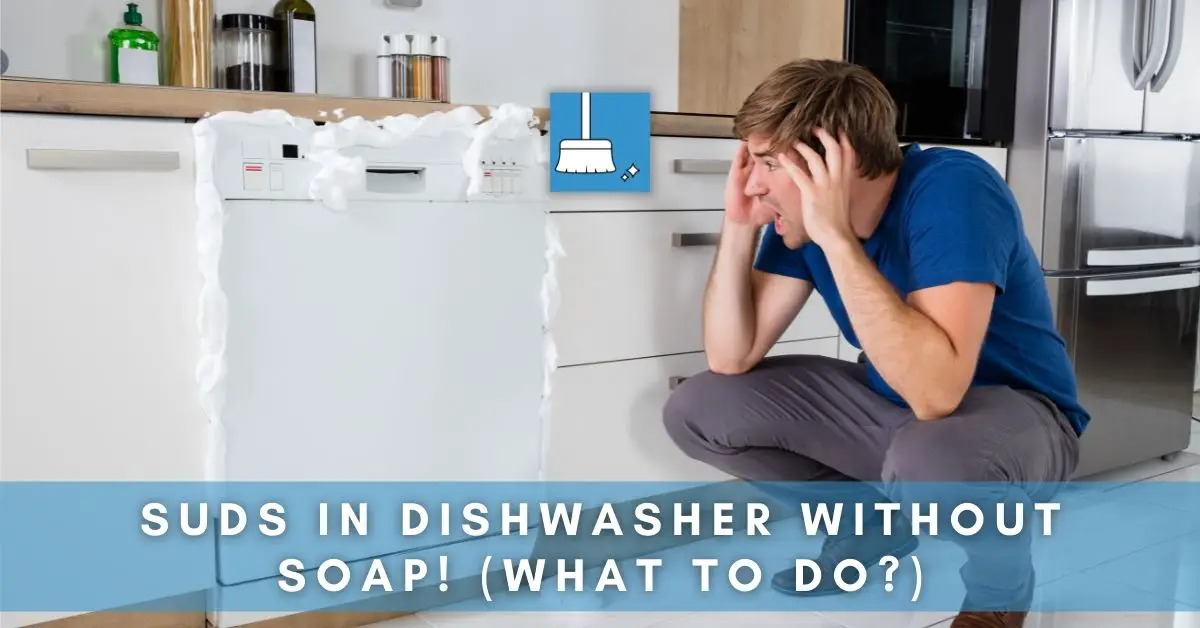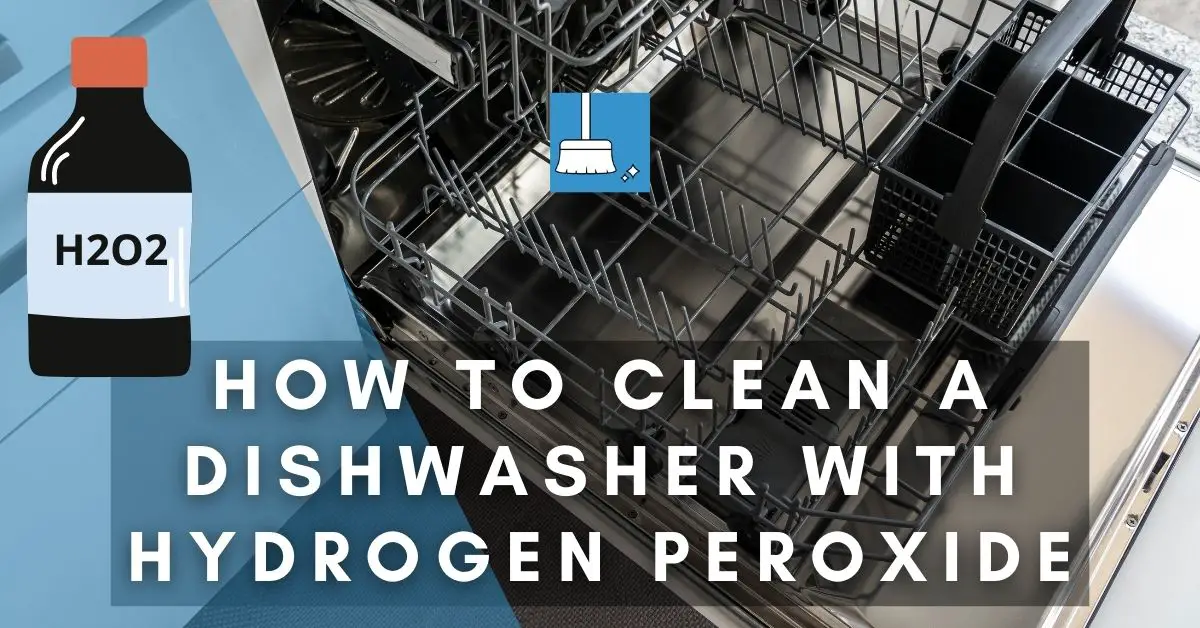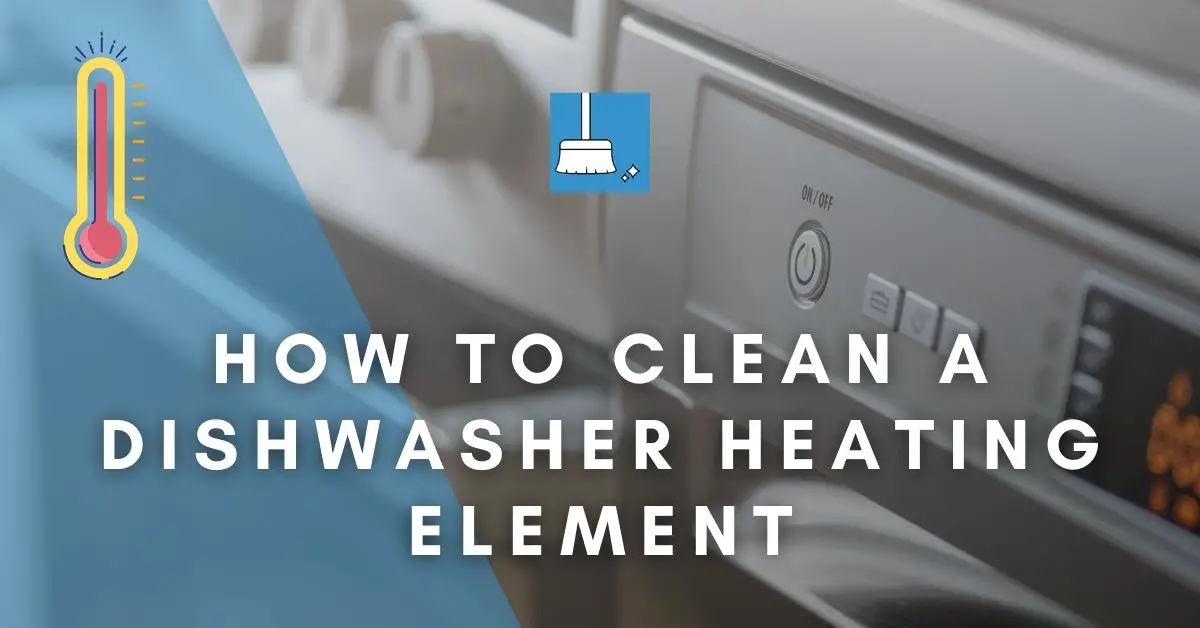When the dishwasher is opened after the rinse cycle, it is expected that only a few droplets of water should be seen inside the machine as a result of the cleaning it had just undergone.
Many times people encounter unexpected suds even if they haven’t used any soap. Obviously, this arouses questions about the origin of that soap.
This article is going to uncover the root cause of suds in your dishwasher and give you solutions.
Suds in Dishwasher Without Soap!
Discovering soap suds clinging onto the inner surface of the machine or even coming out of the closed dishwasher door can be frustrating to watch.
What Causes Suds in Dishwasher Even Without Using Soap?
Here are the main reasons your dishwasher is producing foam without even using soap:
1- Dish Soap Liquid Backing Up From the Sink
In the absence of an air gap between your dishwasher and your sink, and also due to a clog in the garbage disposal, soapy water in your sink drain line often is capable of circulating and forcing the water up into your dishwasher.
And whenever you run your dishwasher without soap in it, the dish soap water from the sink mixes with the water from the machine causing suds to form and stick inside.
2- Residue From Dishwasher Detergent
It is no news that dishwasher soaps are capable of clinging to the inner surface area of the machine (and in the drainage) and even to the dishes.
This residue problem makes the inner surface of the machine become soapy even when the dishwasher has exhausted the soap tablet or liquid soap in its detergent dispenser slot and completed a rinse cycle.
Whenever you run the dishwasher without soap, you still get to see traces of soapy foam that had formed from the water in the machine shaking up the soapy surfaces.
Does Rinse Aid Make Suds?
Rinse aid is capable of producing soap suds, and if you are currently facing the problem of a sudsy dishwasher even without using any detergent, rinse aid just might be the culprit.
Rinse aid is a product that softens hard water by reducing the water’s surface tension.
However, the rinse-aid is actually a surfactant. Surfactants are also present in detergents and are the cause of foaminess.
Suds can especially form when large quantities of rinse aid spill or leak directly into the dishwasher while the dishwasher is running its cycle.
How Do Unwanted Suds Affect The Dishwasher?
Suds development is necessary for quality cleaning to happen. They are a by-product of agitated soapy water and in this context, it is the dishwasher detergent mixed with the water flowing into the machine.
However, when the suds begin to become unwanted and unnecessary like those caused by the factors stated above, they shouldn’t be ignored. Here are the reasons why:
1- Your Dishwasher Will Stink
This often comes to play in a case when the suds are caused due to soapy water from the sink or garbage disposal being backed up into the dishwasher.
In this situation, the suds are obviously dirty suds and contain loads of germs [they are a product of soap, food residue, grime, and water] owing to where they came from and would naturally cause the dishwasher to stink after being stagnant in the machine.
2- Reduced Availability of Clean Water for Cleaning Dishes
The water used in rinsing would contain traces of detergent or rinse aid in it and until the source of the suds is addressed, you would not get back clean dishes.
You would naturally fear passing dishes, cutlery, and cups through it for a cleaning cycle because you would end up serving food or drinks in contaminated crockery.
3- Soap Scum
If your dishwasher is creating suds without the presence of a dishwasher detergent or tablet in the soap dispenser, there is undoubtedly soap clinging onto the inner surface area of the dishwasher or leakage as in the case of the rinse aid.
The soap suds would eventually increase the number of slimy films, which are called soap scum, and they would get attached to the walls of the dishwasher like soap residue.
Can Too Much of Suds Damage a Dishwasher?
First, it is important to state that suds in the dishwasher (whatever the causative factor might have been), can only cause damage to the dishwasher only when it is in extreme excess.
And an ‘extreme excess’ in this context means the following:
Suds Seeping Out of the Dishwasher
When the water in the dishwasher bubbles up so much that the suds and soap water begin to seep out of the machine because the degree of the froth has overwhelmed it, then the dishwasher might be on its way to damage.
This situation would, first of all, cause a mess in the kitchen, but also, the water could circulate and touch a wire connected to or from the machine.
This might lead to a spark and cause the machine to shut down.
Blockage in the Dishwasher Drain
Too much suds in the dishwasher can be a hassle for liquid going down the drain.
The accumulated excess suds are capable of causing a blockage in the pipe, making it impossible for the dishwasher to release anything down the drain.
It is one major factor that plumbers deal with when dishwasher owners complain of dishwasher not draining anymore.
The consequence of not being aware of the blockage on time or not addressing it the right way is that it could cause the dishwasher to malfunction and might even affect the sink, as there is a high chance that there might be a backup into the sink drain.
The Solutions!
1- Address the Source
The first step in dealing with suds in dishwashers without the use of dishwasher detergent is to discover and address what is causing the suds.
As we have discussed earlier, the sudden suds development can be due to varying factors like a leaked or spilled rinse aid, backed up sink water, or soap residue.
2- Run the Cycle Continuously
If froth (being present in the dishwasher without soap) is caused by the presence of too much rinse aid in the water and the leak has been addressed, a sure-fire way to get the suds away completely is to run the dishwasher over and again till the suds dissipate.
There is no fixed amount of time to run the dishwasher when this happens because the degree of the suds might differ.
3- Unclog the Garbage Disposal or Sink Drain
A blocked garbage disposal or sink drain can be the culprit in causing unexpected suds in the dishwasher due to soapy water being backed up into the machine.
When this happens, the best course of action is to call a plumber to help out in getting to the roots of the blockage by loosening the sink pipe or plunging the garbage disposal (depending on which is responsible for the issue) in order to halt the soapy water from getting into the dishwasher.
However, don’t try to use a plunger in your dishwasher until it is the last thing that you have as it can damage the delicate parts of the dishwasher.
4- Raise the Dishwasher Drain Hose High
Sometimes, the problem of water being backed up from the sink might not be caused by any form of blockage, it could be that the dishwasher drain hose might just have been set low rather than high.
In cases where the dishwasher is in close proximity to the sink, the drain line of the dishwasher should be raised higher than the sink to avoid water from the sink accidentally slipping into the dishwasher.
5- Fix an Air Gap Between the Dishwasher and Sink Hose
Air gaps are installed to help prevent irregular movement of water to and fro the dishwasher or the sink.
As stated earlier that when suds suddenly appear in the dishwasher despite the absence of detergent in the machine, it could be water from the sink backing up into the dishwasher when in service.
The root cause could be the absence of an air gap and the solution for this problem is to have a plumber fix one.
6- Avoid Using Laundry Detergent or Hand Wash
Using laundry detergent or hand wash in place of the conventional dishwasher detergent often results in oversudsing.
The suds could even be too much to curtail and even when removed and wiped away, they could leave behind residues on the inner walls or filter.
7- Wash the Dishwasher With Vinegar
In order to tackle the soap residue present in the dishwasher, a vinegar bath will do the trick.
You can either manually wash the inner surface area or place a bowl of vinegar in the machine and let it run on a hot cycle.
How to Stop Soap Suds in Dishwasher?
YOU’LL NEED
1- Salt
2- Vinegar
3- Bowl
4- Wet/dry vacuum
STEPS
STEP 1: Power off the dishwasher and remove the racks and plates within.
STEP 2: Either use a bowl to scoop the suds out or a wet/dry vacuum to suck the suds.
STEP 3: When the suds have been greatly reduced, pour a large quantity of salt into the dishwasher and let it run on the hot cycle.
STEP 4: After the cycle is done, pour a large quantity of vinegar into the dishwasher and allow it to run on a hot cycle.
STEP 5: Repeat this method till the suds dissipate.
Conclusion!
Suds can be formed even when you don’t use any soap and there are various causes of this (as explained above).
However, what do you do when suds suddenly appear when there’s no soap in the dishwasher? We gave you the exact solutions to the problem.





